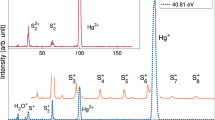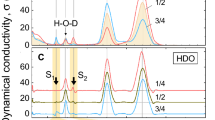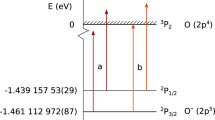Abstract
WE have made a preliminary survey of the principal respects in which the reaction of deuterium with oxygen differs from that of ordinary hydrogen. The deuterium was prepared by the nearly quantitative decomposition of 97 per cent deuterium oxide by repeated passage over pure iron. The reaction with oxygen was studied by methods which have been used in this laboratory in a number of previous investigations of the normal hydrogen–oxygen reaction. All experiments with deuterium were made in alternation with blank experiments carried out sometimes with cylinder hydrogen and sometimes with hydrogen made from water in the apparatus used for preparing the deuterium. No differences between these different specimens of normal hydrogen were found.
This is a preview of subscription content, access via your institution
Access options
Subscribe to this journal
Receive 51 print issues and online access
$199.00 per year
only $3.90 per issue
Buy this article
- Purchase on Springer Link
- Instant access to full article PDF
Prices may be subject to local taxes which are calculated during checkout
Similar content being viewed by others
References
J. Amer. Chem. Soc., 56, 1251; 1934.
Proc. Roy. Soc., A, 141, 29; 1933.
See Hinshelwood and Williamson, "The Reaction of Hydrogen with Oxygen" (Clarendon Press, 1934).
Author information
Authors and Affiliations
Rights and permissions
About this article
Cite this article
HINSHELWOOD, C., WILLIAMSON, A. & WOLFENDEN, J. The Reaction between Oxygen and the Heavier Isotope of Hydrogen. Nature 133, 836–837 (1934). https://doi.org/10.1038/133836c0
Issue Date:
DOI: https://doi.org/10.1038/133836c0
This article is cited by
-
Das schwere Wasserstoffisotop
Die Naturwissenschaften (1934)
Comments
By submitting a comment you agree to abide by our Terms and Community Guidelines. If you find something abusive or that does not comply with our terms or guidelines please flag it as inappropriate.



